Digitalize in Stockholm 2023 – Poster Presentation
Today I gave a poster presentation of my postdoctoral research project at Digitalize in Stockholm 2023. As its only my second month on the new job, the poster is focused on a general overview and two projects I’ve recently begun: Seasonal Craft Implosions (on the poster called A Year of Seasonal Crafts) and Toying with Relations. I had some really lovely conversations regarding taking children (and play) seriously and explorative research methods.
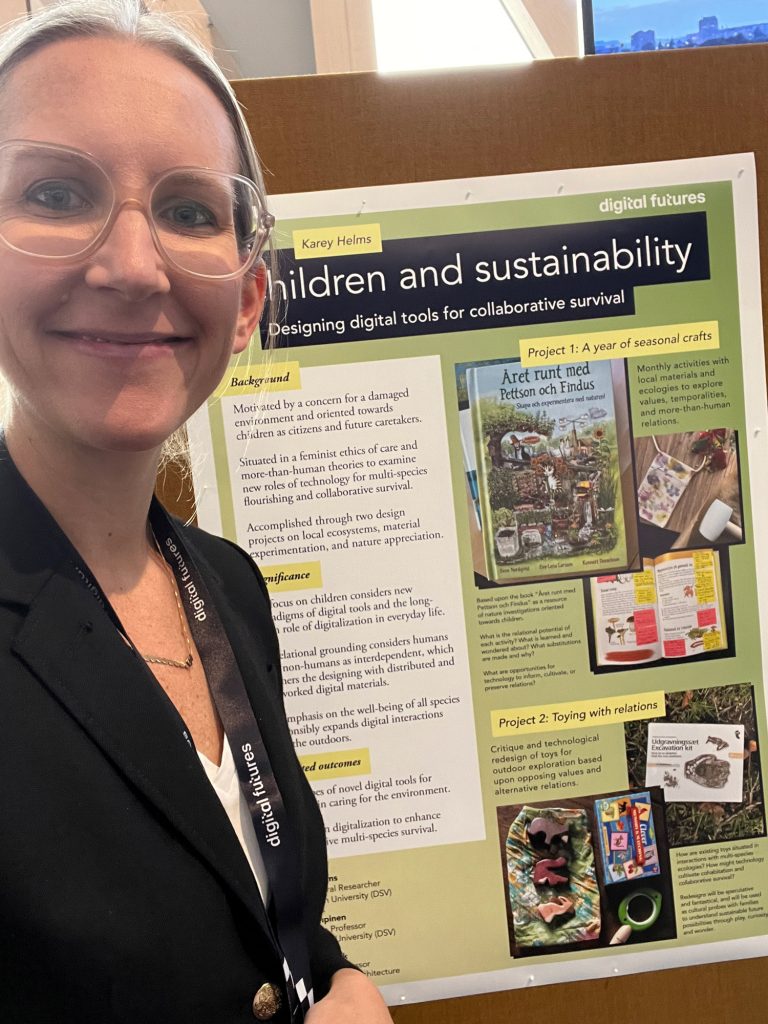
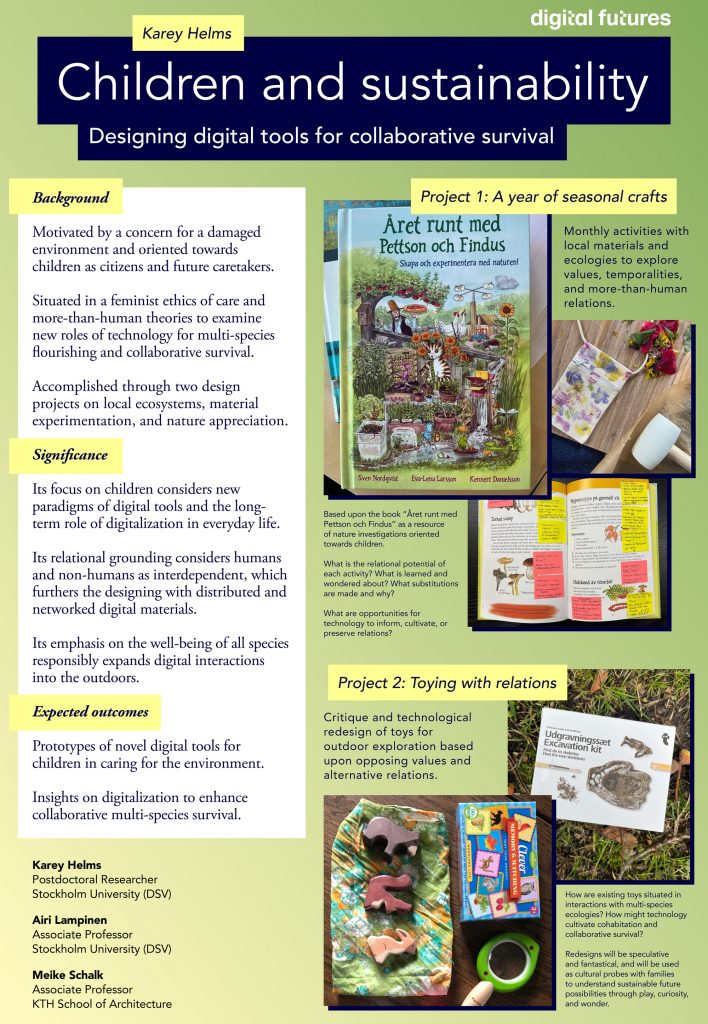
Digital Futures Postdoc Fellowship
Last year I was awarded a digital futures postdoctoral fellow position, which due to parental leave for my second child, I will begin on August 15th, 2023 at Stockholm University. I will be working with Airi Lampinen (Stockholm University) and Meike Schalk (KTH Royal Institute of Technology) on the project Children and sustainability: Designing digital tools for collaborative survival.
About the project
My research will investigate children and digitalization for more sustainable futures. It draws upon a feminist ethics of care and more-than-human theories of collaborative survival to examine new roles of technology in and for multi-species flourishing. This will be done through design-based activities (i.e. research-through-design) that will be situated around topics such as human-waste relations, local ecosystems, and nature appreciation.
Background
This research is motivated by a concern for a damaged environment and is oriented towards children as inhabitants and caretakers of its future. It is significant for the following reasons. Firstly, its focus on children is significant in considering new paradigms of digital tools and the long-term role of digitalization in everyday life. Secondly, its relational grounding within theories of care provides a lens to consider humans as interconnected with non-humans, which is important in developing understandings of designing with distributed and networked digital materials. Thirdly, its emphasis on nature as critical to the health and wellbeing of all species situates an important and often overlooked context for digitalization, which is significant in responsibly expanding digital interactions into the outdoors and nonurban environments.
Dr. Helms
What a privilege on Monday to have my doctoral work presented by Laura Forlano, and deeply engaged with by her and committee Danielle Wilde, Elvin Karana, and Carl DiSalvo (and Martin Avila). Elated, exhausted, overwhelmed, overjoyed, tired, and energized are just a few of the ways I feel. So thankful for the incredible support from everyone near, far, in person, and online. ~ Dr. Helms
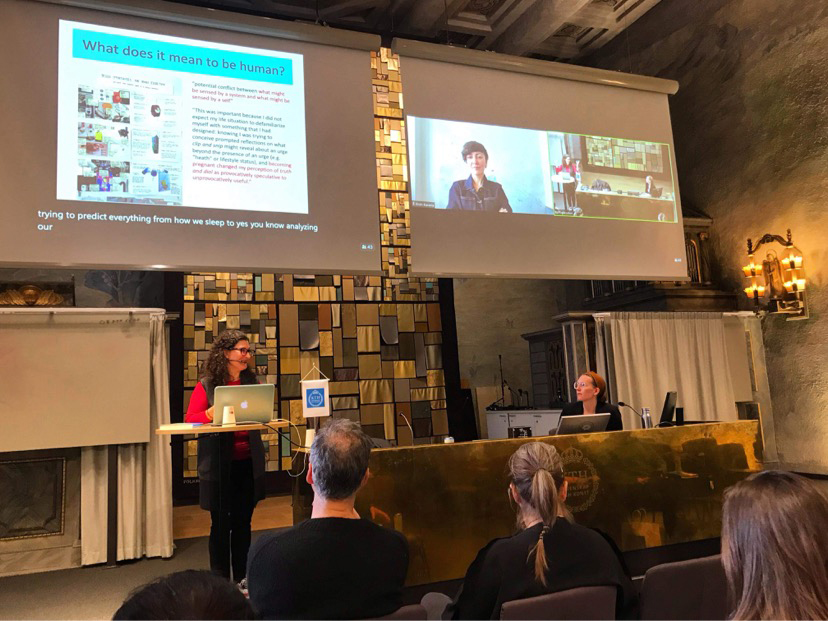
PhD defense!
On Feb 6th 13.00, I’ll be taking a brief intermission from parental leave 👶 to defend my thesis “Designing with care: Self-centered research for interaction design otherwise” ✨ Welcome to join: Kollegiesalen, Brinellvägen 8, Stockholm or on Zoom (https://kth-se.zoom.us/j/67699289253). Abstract below and PDF here!
Opponent: Laura Forlano
Committee: Danielle Wilde, Carl DiSalvo (virtual), Elvin Karana (virtual), Martin Avila
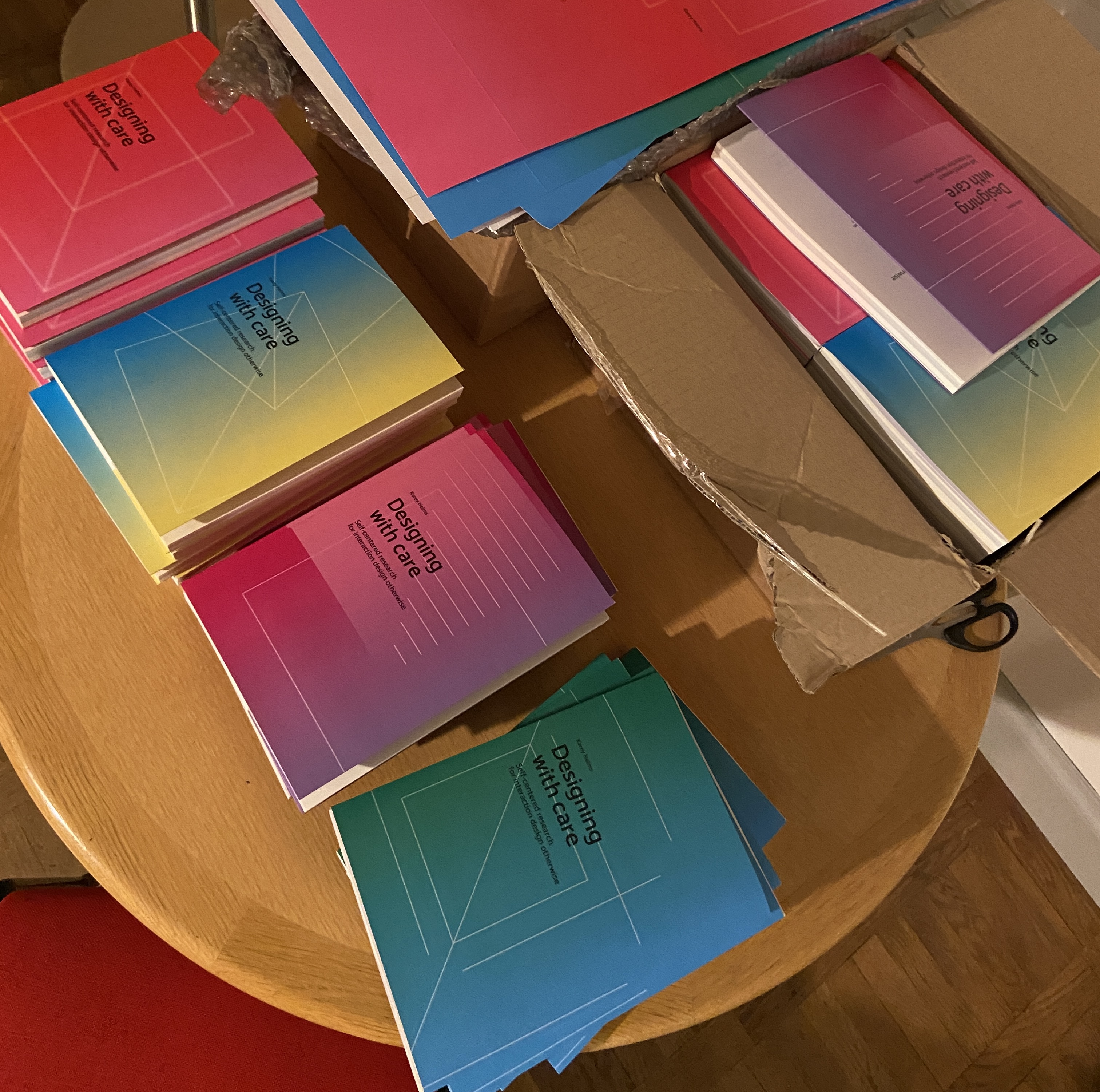
Designing with care: Self-centered research for interaction design otherwise
This dissertation is about the research program designing with care as a pathway towards interaction design otherwise amid a world in crisis. Considering how established ways of doing interaction design will change involves recognizing the role of digital materials in social injustice and systemic inequality. These concerns are inseparable from the material complexity of interactive experiences and their more-than-human entanglements in care. Through five design experiments, I explore everyday human care as wickedly attending to some care doings and not others, and an intimate and generous questioning of oneself as human.
I offer four contributions for interaction designers and design researchers. The first contribution is designing with care. This research program draws upon care ethics and posthumanism to establish four axioms: everyday, wickedness, intimacy, and generosity. Within this programmatic framework, the second contribution is definitions of wickedness and generosity as ethical stances that can be taken by designers and researchers. The third contribution is the synthesis of my four methodological approaches: auto-design, spatial orientations, leaky materials, and open speculations. Each is a generative and analytical pathway towards more sustainable and just futures. The fourth contribution is five careful designs as prototypes of what interaction design otherwise might be like: technologies of human waste, spying on loved ones, leaky breastfeeding bodies, scaling bodily fluids, and a speculative ethics.
From my research program and contributions, I discuss disciplinary resistances to suggest three possibilities for how I argue interaction design should change: engaging with mundane yet unrecognized topics, doing design work where the consequences would be present, and reconsidering how the formats of research publications could better reflect positionality. I then reflect upon the relevancy of self-centered research in moving beyond oneself for more sustainable worlds.
CHI 2022 – Publications
A little over a week ago, I had two papers published at the ACM CHI conference and a position paper shared at the workshop Feminist Voices about Ecological Issues in HCI. Check them out!
Karey Helms. 2022. A Speculative Ethics for Designing with Bodily Fluids. ACM Conference on Human Factors in Computing Systems Extended Abstracts (CHI 2022, alt.chi) New Orleans, LA, USA.
PDF, DOI, Video (8 min), Video (30 sec)
Pedro Sanches, Noura Howell, Vasiliki Tsaknaki, Tom Jenkins, and Karey Helms. 2022. Diffraction-in-action: Designerly Explorations of Agential Realism Through Lived Data. ACM Conference on Human Factors in Computing Systems (CHI 2022), New Orleans, LA, USA. (Best Paper Honorable Mention Award)
DOI, Video (8 min), Video (30 sec)
Karey Helms. 2022. Site-writing around Breastfeeding. ACM Conference on Human Factors in Computing Systems (CHI 2022, Position paper) Workshop “Feminist Voices about Ecological Issues in HCI”, New Orleans, LA, USA.
PhD 90% Seminar
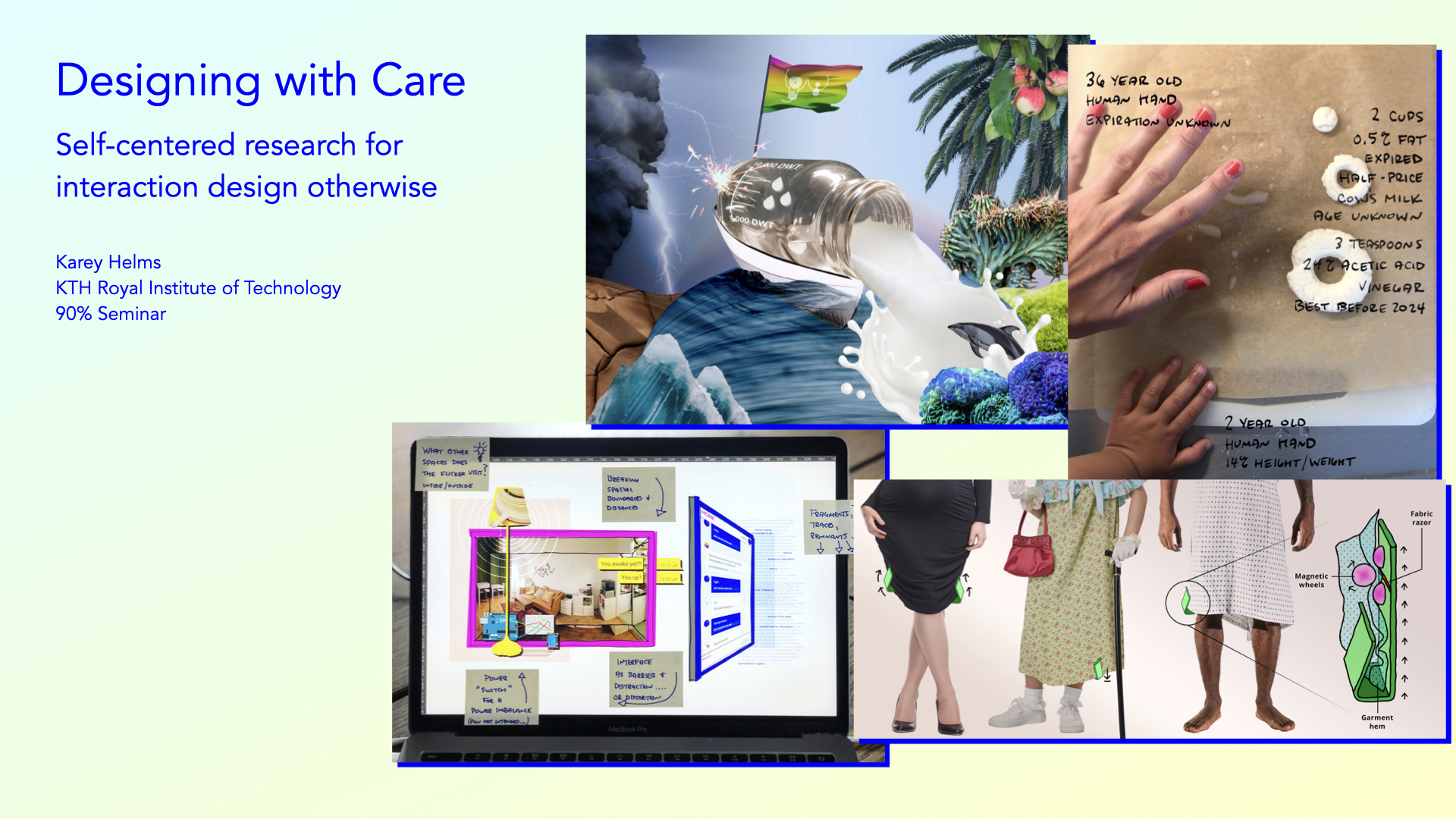
This week I had my 90% (“final”) seminar with Heather Wiltse from Umeå Institute of Design. I’m very appreciative of her engagement with my work and difficult questions that energized me for my next few months of writing. The tentative title and abstract of my thesis below:
Designing with care: Self-centered research for interaction design otherwise
This dissertation is about the research program designing with care as a pathway towards interaction design otherwise amid a world in crisis. Considering how established ways of doing interaction design will change involves recognizing the role of digital materials in social injustice and systemic inequality. These concerns are inseparable from the material complexity of interactive experiences and their entanglements in care. Through five design experiments, I explore wickedly attending to human everyday care, and an intimate and generous questioning of oneself.
I offer four contributions for interaction designers and design researchers. The main contribution is designing with care. Within this programmatic framework, I contribute extended articulations of wickedness and generosity. The third contribution is the synthesis of four methodological approaches: auto- design, spatial orientations, leaky materials, and open speculations. Each is a generative and analytical pathway towards five careful designs as prototypes of what interaction design otherwise might be like: technologies of human waste, spying on loved ones, leaky breastfeeding bodies, scaling bodily fluids, and a speculative ethics. From these, I discuss disciplinary resistances and personal struggles to reflect upon implicating oneself within more-than-human care, and consider the benefits and limitations of designing with care in moving beyond self-centered research towards more sustainable worlds.
DI Webinar – Careful Designs in More-than-human Worlds
This upcoming Thursday (October 28th) at 17.00 CEST I will be giving a talk about my research to Design Informatics Edinburgh! It’s free for anyone to join, but registration is required through eventbrite.
Talk abstract: The design of technology is seen to contribute to worlds in crisis. Pathways towards more ecologically and social just futures include not only designing change, but also considering how to change designing. In this presentation, I explore designing with care as a critical and speculative practice of how design might be otherwise. I first situate my worldview by drawing upon care ethics and posthumanism that recognizes the potential of care as transformative and troubling, and that accentuates more-than-human interdependency and involvement. From this perspective, I then present four examples of what careful designs in more-than-human worlds might be like. These include designing within intimate settings of care that accentuate more-than-human entanglements and everyday survival: spying on loved ones, technology to manage human waste, designing with leaky breastfeeding bodies, and scaling bodily fluids for utopian fabulations. Though these I draw attention to deliberate moments of centering myself, approaching care as spatial, and cultivating generosity in design.
Nordes 2021 – Exploratory Paper
Had a wonderful time this week (virtually) attending my first Nordes conference! In addition to attending the wonderful workshop Life Stories for Collaborative Survival, I also presented the exploratory paper Scaling Bodily Fluids for Utopian Fabulations, a design collaboration with Marie Louise Juul Søndergaard and Nadia Campo Woytuk. Slide GIF below. Very much hope to attend future Nordes conferences!
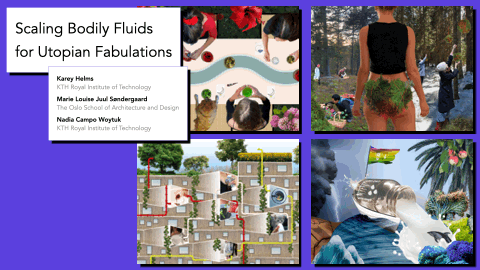
DIS 2021 – Awards
This week I “presented” a full paper and pictorial at the 2021 ACM Designing Interactive Systems (DIS) conference – 10 minute pre-recorded video presentations below – and excited doesn’t quite capture how it feels to share that Entangled Reflections on Designing with Leaky Breastfeeding Bodies received a Special Recognition for Diversity & Inclusion, and Troubling Care: Four Orientations for Wickedness in Design received a Best Paper Honorable Mention Award.
Entangled Reflections on Designing with Leaky Breastfeeding Bodies, DIS 2021
Troubling Care: Four Orientations for Wickedness in Design, DIS 2021
DIS 2021 – Accepted Paper and Pictorial
Excited to have two publications accepted to the 2021 ACM Designing Interactive Systems (DIS) conference: Troubling Care: Four Orientations for Wickedness in Design (paper with Ylva Fernaeus) and Entangled Reflections on Designing with Leaky Breastfeeding Bodies (pictorial).
Troubling Care: Four Orientations for Wickedness in Design
Karey Helms & Ylva Fernaeus
Tensions in designing for care are often positioned as conflicts to be resolved. We draw upon queer theories to investigate caring for loved ones as not “in-line” with normative expectations of care as positive and fulfilling. Through the critique of two autobiographical design projects designed for informal, everyday care of our families, we describe four troubling orientations of care: willful detours, selfish shortcuts, naughty invasions, and unhappy departures. From these, we argue that tensions in care may not always be designed against, but can also be desired and generative.We conclude by discussing a “wickedness” in caring for loved ones that problematizes in-home technologies as attractively naughty and potentially violent, and the four orientations as resources for interaction designers to spatially navigate tensions of domestic care.
Entangled Reflections on Designing with Leaky Breastfeeding Bodies
Karey Helms
Bodily transformations that attend breastfeeding include entanglements of more-than-human materials and agencies. These can be seen in exchanges of physical matter, such as bacteria, that blur bodily boundaries. I present three design explorations of my breastfeeding experiences as entangled: knitting bras for lopsided breasts, transforming milk into fiddling necklaces, and site-writing around breastfeeding. Through spatial and conceptual mappings of the explorations, I propose them as alternative narratives in designing for leaky breastfeeding bodies. I also offer two broader reflections on designing with, for, and among more-than-human bodily materials: generous absence and bodily mappings. The accompanying reading instructions to this bodily research open for further encounters and reflections between the three explorations.
Scaling Bodily Fluids for Utopian Fabulations through Collage-Making
WORKSHOP CALL FOR PARTICIPANTS – On May 18th at 14.00 CET, join Nadia Campo Woytuk, Marie Louise Juul Søndergaard, and me in an online workshop at this year’s Uroboros festival: Scaling Bodily Fluids for Utopian Fabulations through Collage-Making!!
KTH 2020 IxD Team Exhibition
A couple weeks ago, the Interaction Design team at KTH had an internal exhibition of design projects. Due to the pandemic, whereby we primarily work from home, it has been difficult to engage with each other’s design work. Thus, this exhibition was a chance for us to get together (in line with safe distancing) to share our work! I presented a new side project within my PhD that I started while on maternity leave last year, which I call Free the Nipple. Below are some images of my exhibition space and a draft project description. You can find more of the project’s process (and other project work) on my public instagram account.
PhD 50% Seminar
Last Wednesday I had my 50% PhD seminar! Sill processing the feedback from my opponent Lone Koefoed Hansen who Zoomed in from Aarhus University, but very thankful for an inspiring discussion.
A short overview of my research can be found here Careful Design: Implicit Interactions with Care, Taboo, and Humor. And an even shorter snapshot of 2.5 years in 16 seconds:
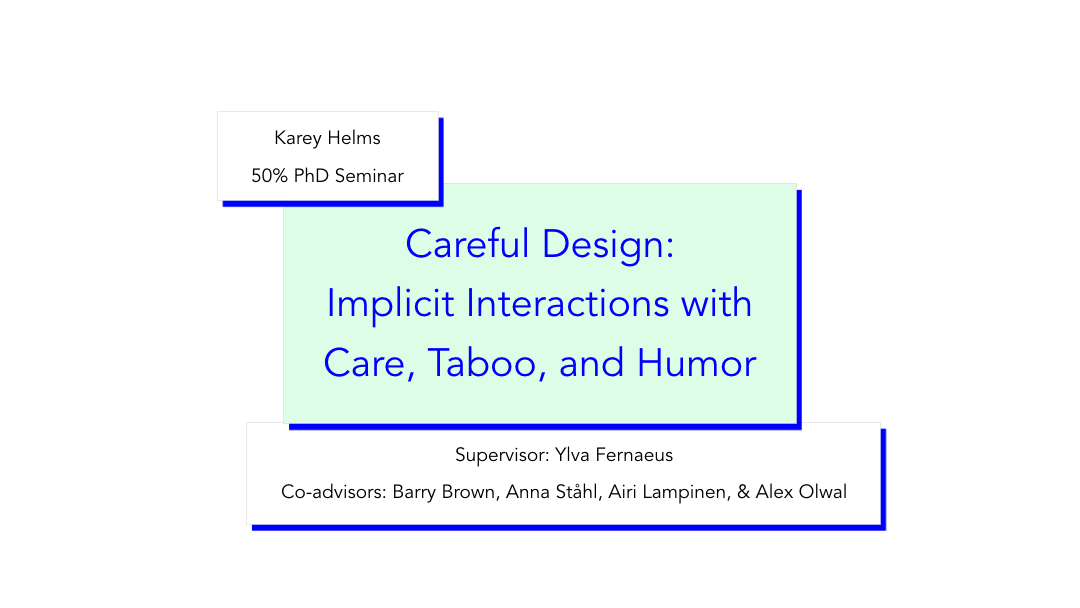
DIS 2020 – Accepted Doctoral Consortium Proposal
Having only recently returned to work full-time in March from ten months of parental leave, and despite working from home rather than in the lab due to COVID-19, it has felt wonderful to re-engage with my research with new energy and focus. Even more rewarding was to recently find out that my Doctoral Consortium proposal was accepted to DIS 2020. Very much looking forward to discussing my work with the Chairs and other participants – even if most likely virtual! Below is my title, abstract, and a link to the pre-print.
GROUP 2020 and CSCW 2019 – Accepted Papers
Very excited to have two papers accepted from an ongoing project on HCI and the outdoors with Airi Lampinen and Barry Brown from Stockholm University and Pedro Ferreira from IT-University of Copenhagen! Below are the abstracts, will post camera ready versions in the coming months. The first in particular and fieldwork that informed both are a precursor to upcoming design work that will ensue in the winter when I return from parental leave.
Away and (Dis)connection: Reconsidering the Use of Digital Technologies in Light of Long-term Outdoor Activities
Karey Helms, Pedro Ferreira, Barry Brown, Airi Lampinen. 2019. Away and (Dis)connection: Reconsidering the Use of Digital Technologies in Light of Long-term Outdoor Activities. ACM International Conference on Supporting Group Work (GROUP 2020), Sanibel Island, Florida, USA.
We present a study of long-term outdoor activities, based on altogether 34 interviews with 19 participants. Our goal was not only to explore these enjoyable experiences, but more broadly to examine how technology use was recontextualized ‘away’ from the everyday. Outdoor activities are commonly presented as an escape from our technology-infused world. In contrast, our interviews reveal experiences that are heavily dependent on technology, both digital and not. However, digital technology — and in particular the mobile phone — is reconfigured when taken out of its ordinary, often urban and indoor, context. We first present a diversity of ‘aways’ during outdoor activities by depicting cherished freedoms and interpersonal preferences. We then describe how participants managed connection and disconnection while away and upon coming back. To conclude, we discuss how constructions of away can support more purposeful engagements with digital technology, and how pointed (dis)connection can be useful for technology design also in non-outdoor settings.
From Nomadic Work to Nomadic Leisure Practice: A Study of Long-term Bike Touring
Pedro Ferreira, Airi Lampinen, Karey Helms, Barry Brown. 2019. From Nomadic Work to Nomadic Leisure Practice: A Study of Long-term Bike Touring. ACM Conference on Computer-Supported Cooperative Work and Social Computing (CSCW 2019), Austin, Texas, USA.
Mobility has long been a central concern in research within the Computer-Supported Cooperative Work (CSCW) community, particularly when it comes to work and how being on the move calls for reorganizing work practices. We expand this line of work with a focus on nomadic leisure practices. Based on interviews with eleven participants, we present a study that illuminates how digital technologies are used to shape and structure long-distance cycling. Our main analysis centers on bike touring as a nomadic leisure practice and on how it offers a radical departure from traditional modes of structuring work and life, and thus, complicates the relationship between work and leisure. We complement this with an account of managing the uncertainties of nomadicity by focusing on participants’ experiences with arranging overnighting and network hospitality. We offer this study, firstly, as one response to the call for more diversity in the empirical cases drawn upon in theorizing nomadic work and leisure practices, but more productively, as an opportunity to reflect upon the temporal and spatial logics of digital technologies and platforms and how they frame our attitudes towards the interplay between work and leisure.
DIS 2019 – Presentation and Slides
Today my paper Do you have to pee? A Design Space for Intimate and Somatic Data will be presented at DIS 2019 in San Diego by a colleague from KTH as I am currently on parental leave with my four week old daughter. Would love to be at the conference presenting and discussing this work, but am more grateful for the conference’s flexibility and Vasiliki Tsaknaki’s assistance in the presentation of this paper while I am instead home in Sweden!
Since this research includes an autobiographic approach and a reflection on my positionality as a design researcher, both of which are critical to the work, the presentation I prepared included both video and audio recording of myself intermixed among a script for Vasiliki (which is why the script includes a mix of first and third person). It was definitely a new challenge rethinking how to make a presentation that included my own voice while using my colleague’s presence for audience engagement! Below is the full written script and slides, and the full paper (which won an honorable mention award!) is available here.
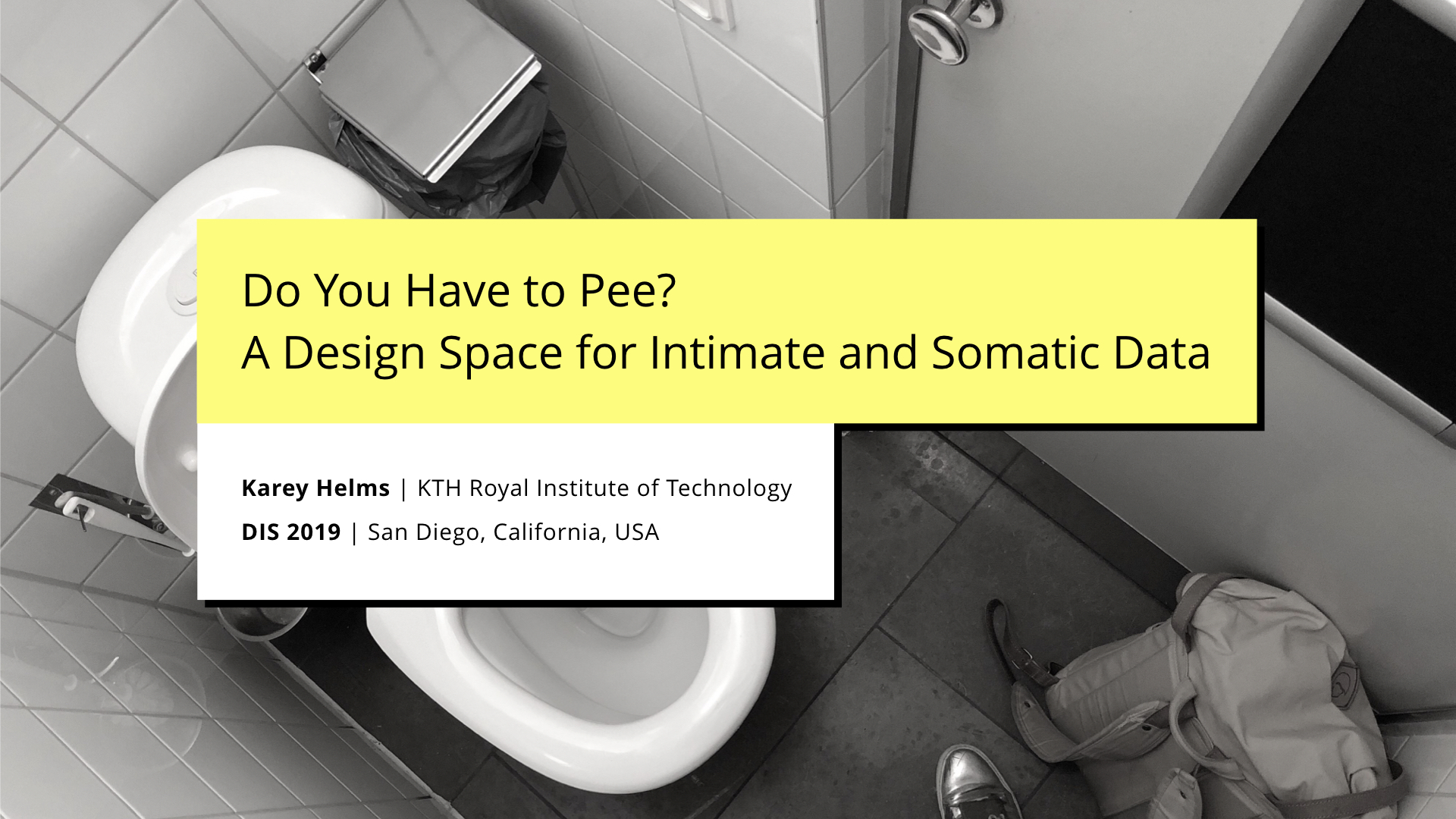
DIS 2019 – Accepted Paper
Couldn’t be more please to find out today that I have a full paper accepted to DIS 2019! Very thankful for my amazing colleagues who provided invaluable support for and feedback on the paper.
Below is the title and abstract, will post a camera ready version in the coming weeks.
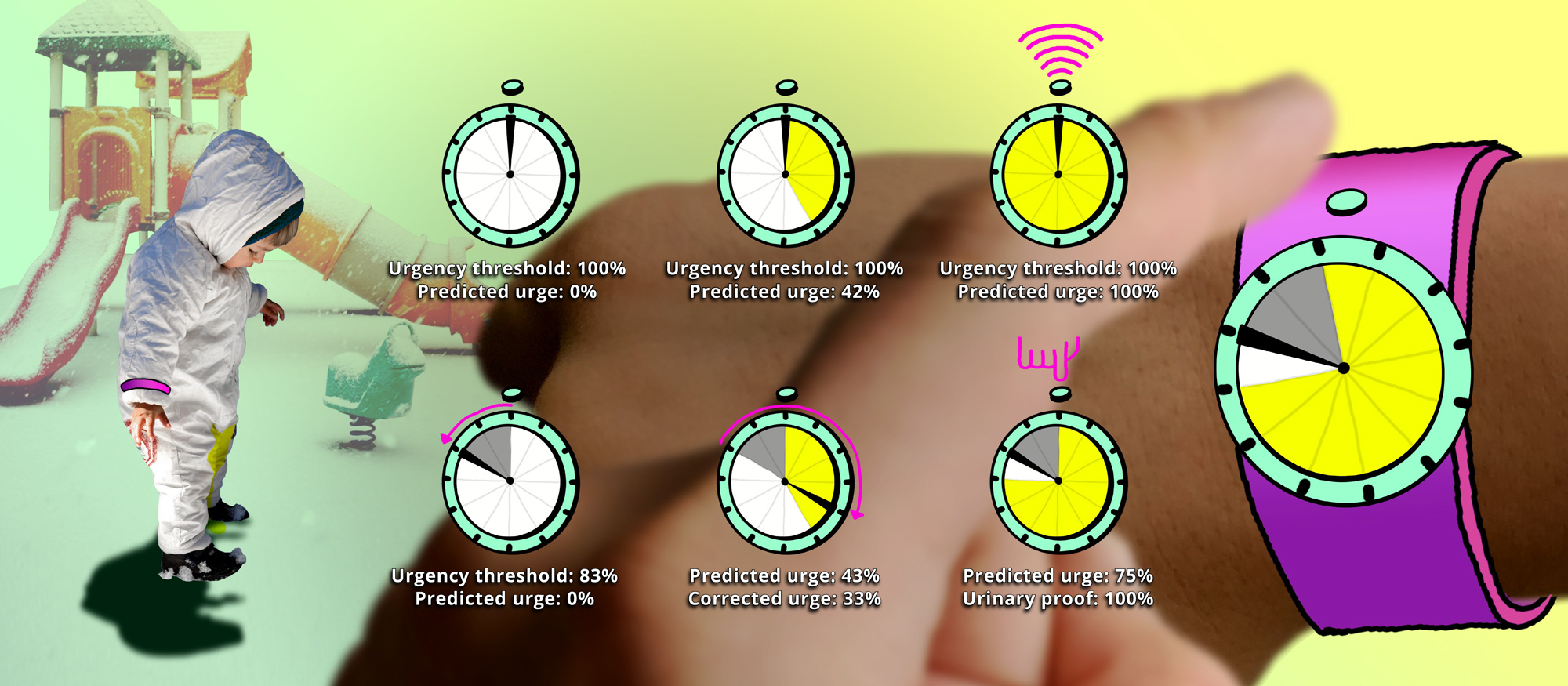
Do you have to pee? A Design Space for Intimate and Somatic Data
The management of bodily excretion is an everyday biological function necessary for our physiological and psychological well-being. In this paper, I investigate interaction design opportunities for and implications of leveraging intimate and somatic data to manage urination. This is done by detailing a design space that includes (1) a critique of market exemplars, (2) three conceptual design provocations, and (3) autobiographical data-gathering and labeling from excretion routines. To conclude, considerations within the labeling of somatic data, the actuating of bodily experiences, and the scaling of intimate interactions are contributed for designers who develop data-driven technology for intimate and somatic settings.
Books read in 2018
Nonfiction
• Purity and Danger: An Analysis of Concepts of Pollution and Taboo. Mary Douglas.
• New Dark Age: Technology and the End of the Future. James Bridle.
• Changing Things: The Future of Objects in a Digital World. Johan Redström and Heather Wiltse.
• Staying with the Trouble through Design: Critical-feminist Design of Intimate Technology. Marie Louise Juul Søndergaard.
• Staying with the Trouble: Making Kin in the Chthulucene. Donna J. Haraway.
• Design Things. Thomas Binder, Giorgio De Michelis, Pelle Ehn, Giulio Jacucci, Per Linde and Ina Wagner.
• How Buildings Learn: What Happens After They’re Built. Stewart Brand.
• On Trails: An Exploration. Robert Moor.
• The Soul of America: The Battle for our Better Angels. Jon Meacham.
• The Big Necessity: Adventures in the World of Human Waste. Rose George.
• Designerly Ways of Knowing. Nigel Cross.
• Guns, Germs and Steel: The Fate of Human Societies. Jared Diamond.
• Humanistic HCI. Jeffrey Bardzell and Shaowen Bardzell.
• Crafting Experience: Designing Digital Musical Instruments for Long-Term Use in Artistic Practice. Ludvig Elblaus.
• Making Design Theory. Johan Redström.
• Automating Inequality: How High-Tech Tools Profile, Police, and Punish the Poor. Virginia Eubanks.
• Lab Coats in Hollywood: Science, Scientists, and Cinema. David A. Kirby.
• Why We Sleep: Unlocking the Power of Sleep and Dreams. Matthew Walker.
• Toilet: Public Restrooms and the Politics of Sharing. Harvey Molotch and Laura Noren.
• Quiet: The Power of Introverts in a World That Can’t Stop Talking. Susan Cain.
• Human-Machine Reconfigurations: Plans and Situated Actions. Lucy Suchman.
• Masters of Craft: Old Jobs in the New Urban Economy. Richard E. Ocejo.
• The 80/20 Principle: The Secret to Achieving More with Less. Richard Koch.
• Machine Learners: Archaeology of a Data Practice. Adrian Mackenzie.
• Weapons of Math Destruction. Cathy O’Neil.
• Technology as Experience. John McCarthy and Peter Wright.
• Making Preciousness: Interaction Design Through Studio Crafts. Vasiliki Tsaknaki.
Literary Nonfiction
• French Children Don’t Throw Food. Pamela Druckerman.
• The Almost Nearly Perfect People: Behind the Myth of the Scandinavian Utopia. Michael Booth.
• Outline. Rachel Cusk.
• A Walk in the Woods: Rediscovering America on the Appalachian Trail. Bill Bryson.
• Vagabonding: An Uncommon Guide to the Art of Long-Term World Travel. Rolf Potts.
• Born to Run: A Hidden Tribe, Superathletes, and the Greatest Race the World Has Never Seen. Christopher McDougall.
• Tuesdays with Morrie. Mitch Albom.
• Walden: Civil Disobedience. Henry David Thoreau.
Fiction
• A Little Life. Hanya Yanagihara.
• Cowboys Are My Weakness. Pam Houston.
• Little Fires Everywhere. Celeste Ng.
• Where the Crawdads Sing. Delia Owens.
• The Summer Book. Tove Jansson.
• Dubliners. James Joyce.
• The Night Circus. Erin Morgenstern.
• 12 Short Stories: A Key to the Georgian Mentality. Archil Khantadze.
• The Nightingale. Kristin Hannah.
• Eleanor Oliphant Is Completely Fine. Gail Honeyman.
• All the Light We Cannot See. Anthony Doerr.
• Rules of Civility. Amor Towles.
• Small Great Things. Jodi Picoult.
KTH 2018 PhD Supervisory Panel
Today was our department’s annual PhD Supervisory Panel at KTH during which PhD students are given the opportunity to get feedback from senior researchers who act as “guest supervisors.” To prepare for my meeting with two Associate Professors I reworked my research abstract and research questions following my 30% seminar in October, during which Johan Redström from Umeå Institute of Design acted as my discussant. My goals in today’s supervisory panel were to get feedback on the new scope of my abstract and research questions relative to being only about 40% through my PhD (and I’m sure will continue to evolve), and identify important areas that I need to work on articulating to more firmly position my research in the context of how I am conceptually “furnishing” my design space. Considering I was presenting to senior researchers from different academic backgrounds than my own and each other, it was especially helpful to see within which aspect I felt misunderstood, i.e. where I need to sharpen my arguments. Below my poster summarizing my research thus far, followed by a few notes/reflections based on feedback received today, and a textual version of my abstract and research questions.
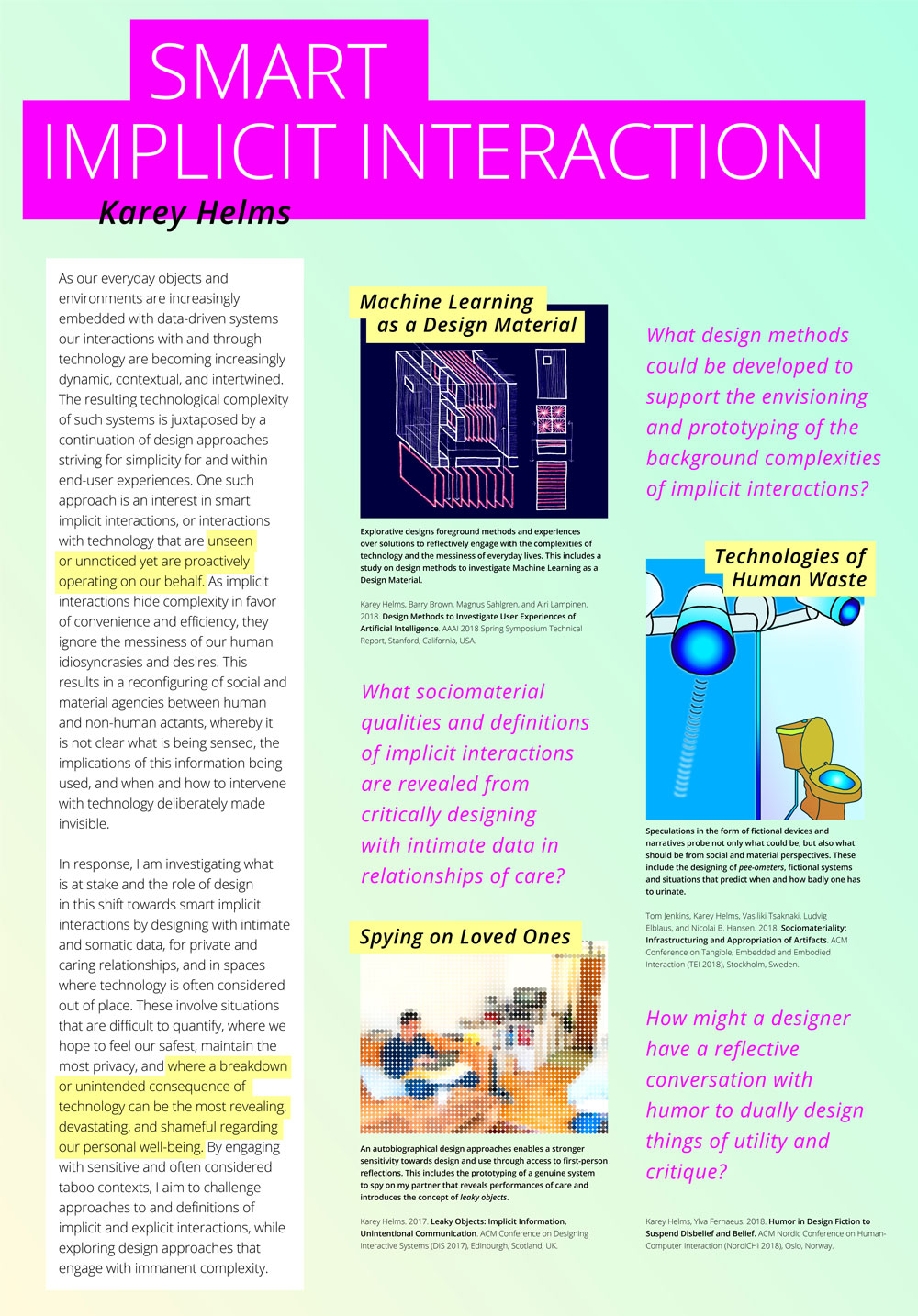
UID Wednesday Lecture 2018 – Crafting Humorous Fictions & Taboo Frictions
Yesterday I had the pleasure of spending the day at Umeå Institute of Design (where I did my MFA in Interaction Design). In the morning I spent a couple hours with upcoming IxD master thesis students to discuss my experience, and in the afternoon gave a talk titled “Crafting Humorous Fictions & Taboo Frictions” as part of the design school’s Wednesday lecture serious. Was great to be back, even if only for a day! Below is the abstract of my talk.
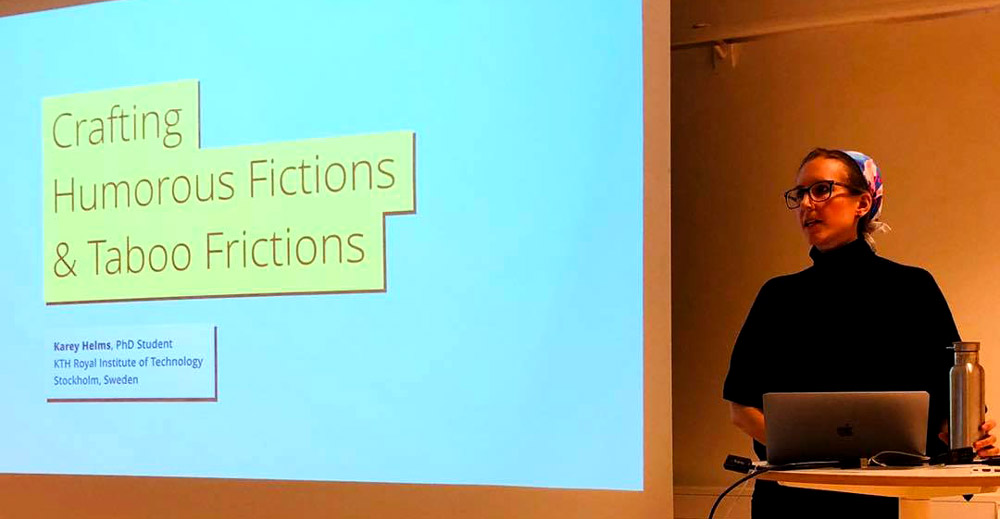
Talk abstract
Karey Helms is a PhD Student at KTH Royal Institute of Technology researching smart implicit interactions, those that are unseen or unnoticed yet proactively operate on our behalf. Her research through design approach includes speculative and autobiographical methods in which she designs humorous fictions and taboo frictions with intimate and somatic data to surface the social and societal implications of data-driven systems. These include the designing of fictional devices that predict when and how badly one has to urinate, and the prototyping of a genuine system to spy on her partner.
In this talk, she traces back her playful approach to fiction and friction to her master’s thesis in Interaction Design at UID and how she employed this approach while working in industry delivering actualized services within enterprise IoT prior to beginning her PhD. The aim of this talk is to advocate for humor in design and to craft experiences that disrupt and disturb to not only provoke others to think, but also yourself as a designer.